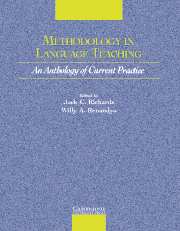Book contents
- Frontmatter
- Contents
- Acknowledgments
- Introduction
- Section I Approaches to Teaching
- Section 2 Lesson Planning and Classroom Management
- Section 3 Classroom Dynamics
- Section 4 Syllabus Design and Instructional Materials
- Section 5 Task and Project Work
- Section 6 Learning Strategies
- Section 7 Teaching Grammar
- Section 8 Teaching Pronunciation
- Section 9 Teaching Speaking
- Section 10 Teaching Listening
- Section 11 Teaching Vocabulary
- Section 12 Teaching Reading
- Section 13 Teaching Writing
- Section 14 Assessment
- Section 15 Technologies in the Classroom
- Section 16 Professional Development
- Credits
- Author Index
- Subject Index
Section 7 - Teaching Grammar
Published online by Cambridge University Press: 10 November 2010
- Frontmatter
- Contents
- Acknowledgments
- Introduction
- Section I Approaches to Teaching
- Section 2 Lesson Planning and Classroom Management
- Section 3 Classroom Dynamics
- Section 4 Syllabus Design and Instructional Materials
- Section 5 Task and Project Work
- Section 6 Learning Strategies
- Section 7 Teaching Grammar
- Section 8 Teaching Pronunciation
- Section 9 Teaching Speaking
- Section 10 Teaching Listening
- Section 11 Teaching Vocabulary
- Section 12 Teaching Reading
- Section 13 Teaching Writing
- Section 14 Assessment
- Section 15 Technologies in the Classroom
- Section 16 Professional Development
- Credits
- Author Index
- Subject Index
Summary
INTRODUCTION
The role of grammar is perhaps one of the most controversial issues in language teaching. In the early parts of the twentieth century, grammar teaching formed an essential part of language instruction, so much so that other aspects of language learning were either ignored or downplayed. The argument was that if you knew the grammatical rules of the language, you would be able to use it for communication. This concept was strongly challenged in the early 1970s. Knowledge of the grammatical system of the language, it was argued, was but one of the many components which underlay the notion of communicative competence. To be considered a competent user of a language, one needs to know not only the rules of grammar, but also how the rules are used in real communication. During this period, grammar teaching became less prominent, and in some cases, was abandoned.
In recent years, grammar teaching has regained its rightful place in the language curriculum. People now agree that grammar is too important to be ignored, and that without a good knowledge of grammar, learners' language development will be severely constrained. There is now a general consensus that the issue is not whether or not we should teach grammar. The issue now centers on questions such as, Which grammar items do learners need most? How do we go about teaching grammar items in the most effective way? Are they best taught inductively or deductively?
Information
- Type
- Chapter
- Information
- Methodology in Language TeachingAn Anthology of Current Practice, pp. 145 - 147Publisher: Cambridge University PressPrint publication year: 2002
